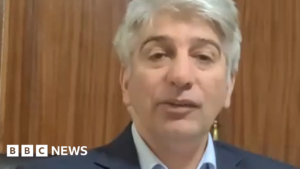IMF chief warns low growth and high debt weigh on global economy


The head of the International Monetary Fund cautioned on Thursday that high debt and low growth remained major impediments to the global economy.
IMF Managing Director Kristalina Georgieva told CNBC that while notable progress had been made in the global economic recovery, governments had become too accustomed to borrowing, with “anemic growth” adding to the challenges of servicing that debt.
“It’s not yet time to celebrate,” she told Karen Tso. “When we look into the challenges ahead of us, the biggest one is low growth, high debt. This is where we can and must do better,” she added.
While Georgieva commended the work of major central banks in taming inflation, she noted that the achievements had not been universal and that some economies were continuing to struggle with higher prices, which was adding to social and political discontent.
“It is successful major economies that have done really well … and there are pockets in the world where inflation is still a problem,” she said.
“The impact of higher prices remains, and it is making many people in many countries feel worse off and angry.”
The comments come as finance ministers and central bank governors are set to meet next week in Washington DC for the 2024 annual meetings of the IMF and the World Bank Group. They will discuss topics including the world economic outlook, poverty eradication and the green energy transition.
Georgieva warned that international trade would no longer be the “engine of growth” it once was, highlighting the proliferation of restrictive policies among many economies.
The U.S. and the European Union have moved to impose a series of punitive tariffs against China over what they deem as Beijing’s unfair trade practices.
“What we are seeing in the United States, but also elsewhere, is pressures from people who understandably feel that globalization did not work for them; their jobs disappeared, their communities had not been attended, and concerns on security grounds — mostly grounded in the impact of the pandemic, and the impact of Russia’s aggression against Ukraine — they bring national security priorities up on the list,” she said.
“All of this indeed is creating more of an environment of mistrust and now it is advanced economies more than emerging markets that are leading in industrialist measures [and] in protectionist measures.”
The IMF managing director has previously warned against such restrictions, telling CNBC in June that the growing “love” of curbs, such as tariffs, were damaging to international development.
On Thursday, she doubled down on that message insisting that “retaliatory” trade measures could hurt the implementers as much as their targets.
“Our advice is, carefully look at the costs and benefits and what that may mean in [the] medium term. And of course we do our part by calculating the cost and benefits, and showing who bears them, because tariffs are usually borne by businesses and consumers in the country that introduces them,” she said.
Earlier on Thursday, Georgieva also pointed to wider geopolitical tensions as one of the key risks to global financial stability.
“We are all very worried about the expanding conflict in the Middle East and its potential to destabilize regional economies and global oil and gas markets,” she said during her curtain raiser speech.
#IMF #chief #warns #growth #high #debt #weigh #global #economy
News plays a pivotal role in our lives by keeping us informed and connected to the world. It serves as a critical source of information, offering updates on current events, politics, economics, science, and more. Through news, we gain awareness of global issues and local developments, helping us make informed decisions in our personal and professional lives. News also fosters discussion and debate, encouraging critical thinking and perspective-taking. Moreover, it promotes transparency and accountability among governments, businesses, and other institutions. In a rapidly changing world, staying updated with the news enables us to adapt to new challenges and opportunities, shaping our understanding of the complexities of society. Ultimately, news is not just about information; it empowers us to participate actively in the world around us, contributing to a more informed, engaged, and responsible global citizenry.
Health is fundamental to our well-being and quality of life, making it an essential aspect of daily existence. It encompasses physical, mental, and emotional aspects, influencing our ability to function effectively and enjoy life fully. Prioritizing health allows individuals to maintain optimal physical fitness, reducing the risk of diseases and promoting longevity. Mental health, equally crucial, affects our cognitive abilities, emotional stability, and overall happiness. Investing in preventive healthcare through exercise, balanced nutrition, and regular medical check-ups helps in early detection of potential health issues, ensuring timely intervention and treatment. Beyond individual benefits, a population’s health impacts societal productivity and economic stability. Governments and organizations worldwide emphasize public health initiatives to address pandemics, health disparities, and promote overall well-being. Ultimately, health serves as the foundation upon which we build our lives, influencing our ability to pursue goals, nurture relationships, and contribute meaningfully to society.
Money plays a crucial role in our lives as a means of financial security and freedom. It enables us to meet basic needs such as food, shelter, and healthcare, while also providing opportunities for education, travel, and personal growth. Beyond material comforts, money facilitates social connections and experiences that enrich our lives. It empowers individuals to invest in their futures, whether through savings, investments, or entrepreneurial ventures, thereby fostering economic stability and growth. However, the pursuit of wealth should also be balanced with ethical considerations, as money can influence relationships and societal dynamics. Responsible management of finances is key to achieving long-term goals and mitigating financial stress. Ultimately, while money is a tool for achieving aspirations and fulfilling desires, its true value lies in how it is utilized to improve both personal well-being and the broader community.
Earning Easy Money in 2024: Opportunities and Considerations 💸
In 2024, the landscape of earning easy money presents diverse opportunities, albeit with considerations. The digital age offers platforms for freelancing, online trading, and e-commerce, allowing individuals to leverage skills and creativity for financial gain. Cryptocurrency investments continue to allure with potential for quick profits, yet they entail high volatility and risk. Moreover, the rise of the gig economy enables flexible work arrangements through apps and websites, offering quick payouts but often without job security or benefits. Passive income streams such as rental properties and investments in stocks or bonds remain viable, but demand initial capital and ongoing management. Amid these options, caution is essential to avoid scams and unsustainable ventures promising overnight success. Ultimately, while the allure of easy money persists, informed decisions, diligence, and a long-term perspective are crucial for sustainable financial growth and security in the dynamic year ahead.




